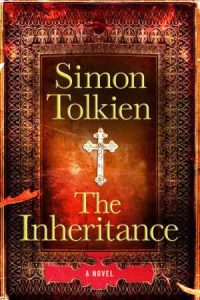Reviews
Richmond Times Dispatch – April 25, 2010
“Expertly paced — the suspense builds to nearly unbearable levels — and filled with fascinating characters, ‘The Inheritance’ also showcases Tolkien’s spare, graceful prose — and his moral fervor. He spins a gripping story, but there’s more to ‘The Inheritance’ than smarts and skill. It’s also a meditation on the death penalty, and Tolkien leaves no doubt that he’s an ardent opponent.
A deft combination of Agatha Christie manor-house whodunit, Erle Stanley Gardner courtroom drama and Dan Brown thriller, ‘The Inheritance’ is nonetheless unique to its creator. And Tolkien, with this compelling read, proves himself worthy — and then some — of his literary pedigree.”
Charlotte Observer – April 25, 2010
“The Inheritance” is a story of parents and children that deals heavily in family dynamics, as well as a courtroom drama that capitalizes on [Tolkien’s] experience there. Tolkien also throws in an ancient “codex, a la “The Da Vinci Code,” for those who enjoy a good historic artifact. The tone is weighty and measured. …it’s a solid book and a nice trip to the mid-20th century if you’re so inclined.”
New York Times – April 14, 2010
“Simon Tolkien’s grandfather is J. R. R., but his new novel owes more to Agatha Christie — and Dan Brown. The setup: five people are at Moreton Manor the night Professor John Cade is shot dead. His estranged son Stephen is on trial for the murder, but Detective Inspector William Trave of the Oxford police can’t quite shake the feeling that the wrong man is in the dock. Stephen is hardly the only person who might have wanted Professor Cade dead — there’s his brother, Silas, for starters, who was also about to be cut out of his father’s will. And what of the ancient book — the Marjean codex — that Cade forcibly took from the owners of a French chateau in the book’s prologue? Might it really lead to St. Peter’s cross — “made from a fragment of the true cross on which Our Lord suffered” — as Sasha Vigne, Cade’s mysterious personal assistant, who was also in the house that night, believes?”
— Amy Virshup
Bookreporter.com – April 10, 2010
“…The novel definitely has the feel of a classic Agatha Christie, and I found a lot of similarity to her novel/play WITNESS FOR THE PROSECUTION. Like a traditional Christie play, THE INHERITANCE is written in three acts, and the denouement revealed in the final act will definitely stun even the more experienced mystery reader. Combining elements of a classic whodunit with those of a legal thriller and the currently popular historical-based fiction, Tolkien has created a winner of a novel that succeeds on all levels and makes for an exciting read…”
Booklist – January 15, 2010 – Starred review
The promotional material for former British criminal barrister Tolkien’s second novel (the first, The Final Witness, was published in 2002) shamelessly plays up the fact that the author is the grandson of J. R. R. Tolkien. Enough of this literary-pedigree nonsense. As Tolkien shows in both his mysteries, he does not need to have his DNA trumpeted; he is a first-rate writer in his own right. His latest thriller moves from a horrific crime perpetrated on a French family by two British soldiers during World War II and then straight into 1959, with the opening of a trial at the Old Bailey. Tolkien provides the kind of caustic portraits of judges and barristers and knowledge of the innermost cells of the Old Bailey that the late John Mortimer, also a barrister, delighted readers with in the Rumpole series. On trial is 22-year-old Stephen Cade, accused of shooting his estranged father in the head. The father was a war hero and then a well-heeled university professor. The son had motive: the father had just written him out of his will and denied him a requested sum of money. He had opportunity: he was, apparently, and by his own admission, with his father in his library. And his prints were on the gun that was found near the body. But something seems off to the officer in charge of the case. Detective Inspector William Trave of the Oxford CID uses the window of opportunity between trial and sentencing to trace the locked-room mystery back to its origins in France. Written with great surety and absolutely compelling.
— Connie Fletcher
Library Journal – February 1, 2010
This second novel (after The Final Witness) by J.R.R. Tolkien’s grandson is a legal thriller, World War II historical novel, and Da Vinci Code treasure hunt all rolled into one. Stephen Cade, son of a famed historian and war hero, is quickly convicted and sentenced to death for his father’s murder, based on circumstantial evidence. Detective Bill Tave’s instincts tell him there is more to the story, and right he is. There were five others in the Cade mansion that night, some of whom had a clear interest in whether the old professor lived or died. VERDICT This intricate story, which includes a distant father, the hunt for a religious artifact, and much detail about British society and its justice system, is a bit overambitious. However, it moves quickly, and the motives of the characters provide energy and drive to what turns out to be an absorbing 1950s-era mystery. Should appeal to fans of legal thrillers and British procedurals and such authors as Charles Todd.
— Nancy Fontaine, Dartmouth Coll., Hanover, NH

